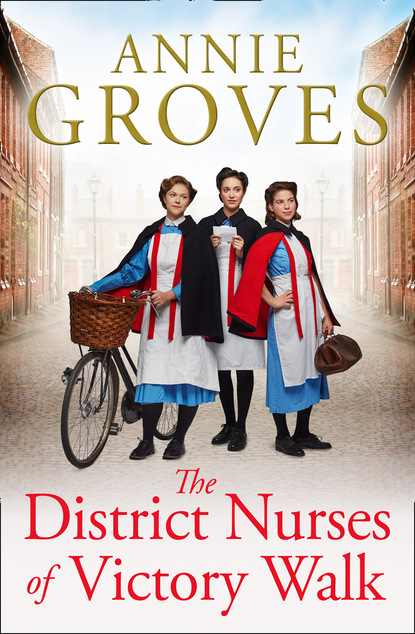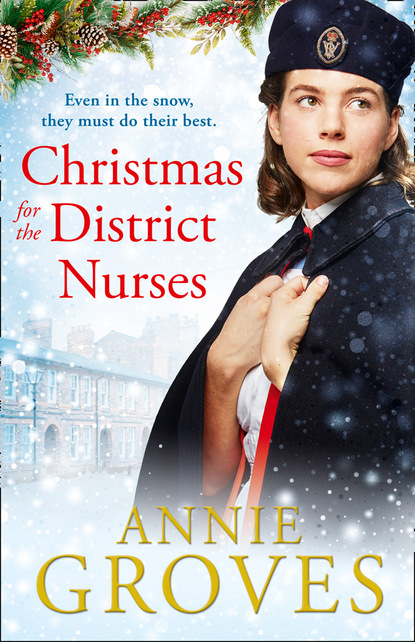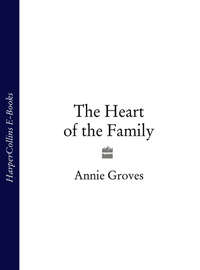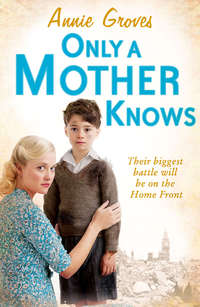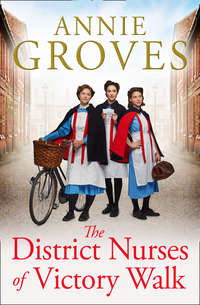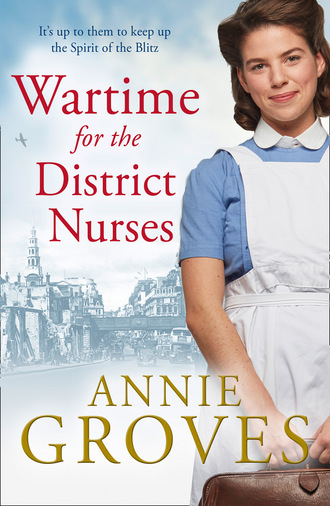
Полная версия
The District Nurse

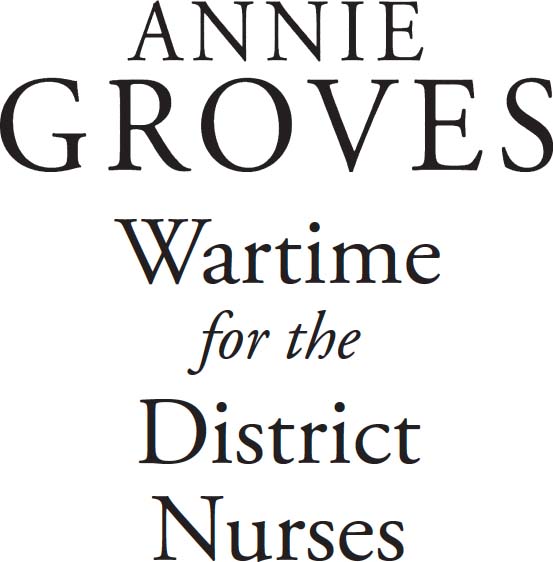

Copyright
Published by HarperCollinsPublishers Ltd
1 London Bridge Street
London SE1 9GF
www.harpercollins.co.uk
First published in Great Britain by HarperCollinsPublishers 2019
Copyright © Annie Groves 2019
Cover design by Holly Macdonald © HarperCollinsPublishers Ltd 2019
Cover photographs © Jonathan Ring (models), Lebrecht Music & Arts / Alamy Stock Photo (background)
Annie Groves asserts the moral right to be identified as the author of this work.
A catalogue copy of this book is available from the British Library.
This novel is entirely a work of fiction. The names, characters and incidents portrayed in it are the work of the author’s imagination. Any resemblance to actual persons, living or dead, events or localities is entirely coincidental.
All rights reserved under International and Pan-American Copyright Conventions. By payment of the required fees, you have been granted the non-exclusive, non-transferable right to access and read the text of this e-book on screen. No part of this text may be reproduced, transmitted, down-loaded, decompiled, reverse engineered, or stored in or introduced into any information storage and retrieval system, in any form or by any means, whether electronic or mechanical, now known or hereinafter invented, without the express written permission of HarperCollins.
Source ISBN: 9780008272241
Ebook Edition © April 2019 ISBN: 9780008272258
Version: 2019-02-25
Dedication
Many, many thanks Teresa Chris, Kate Bradley and Pen Isaac – the dream team.
Contents
Cover
Title Page
Copyright
Dedication
Chapter One
Chapter Two
Chapter Three
Chapter Four
Chapter Five
Chapter Six
Chapter Seven
Chapter Eight
Chapter Nine
Chapter Ten
Chapter Eleven
Chapter Twelve
Chapter Thirteen
Chapter Fourteen
Chapter Fifteen
Chapter Sixteen
Chapter Seventeen
Chapter Eighteen
Chapter Nineteen
Chapter Twenty
Chapter Twenty-One
Chapter Twenty-Two
Chapter Twenty-Three
Chapter Twenty-Four
Chapter Twenty-Five
Chapter Twenty-Six
Chapter Twenty-Seven
Chapter Twenty-Eight
Chapter Twenty-Nine
Chapter Thirty
Chapter Thirty-One
Read on for a Q&A with Jenny Shaw, the author behind Annie Groves
Keep Reading …
About Annie Groves
Also by Annie Groves
About the Publisher
CHAPTER ONE
Summer 1940
Edith Gillespie woke up and for a moment could not work out where she was. Her brain was too befuddled with sleep to remember and there was no light to give her a clue. She struggled to work it out.
Not in the house where she’d grown up in south London, that was for sure, because there would have been the sound of at least one of her many siblings breathing, or snoring, or sneezing. She’d never had the luxury of a room to herself for all those years, not until she’d left home to train as a nurse. She didn’t think she was in her nurses’ dormitory, though. That had been near a station and you could always hear the trains, or porters and drivers shouting. After that she’d chosen to take extra training as a district nurse, but this didn’t feel like the home in Richmond. It must be wherever she’d gone after that.
Now it all came back to her. She was at the North Hackney Queen’s Nurses home on Victory Walk, in Dalston. This was her little attic room, and the reason it was so dark was that the blackout blind was firmly in place. The country was at war, and had been for nearly a year. It was warm as it was summer, and from the birdsong outside it was already dawn. Slowly she sat up and shook her head, trying to wake up.
Her dream lingered on the fringes of her mind. The details had gone but the sensation of happiness – of being cared for – remained, and she smiled in the darkness, savouring that comforting and thrilling feeling. Somebody loved her and she loved them back.
Then she remembered and cried out despite herself. Harry was gone. Harry Banham, the most handsome and wonderful man in the world, had not made it back from Dunkirk, and she was alone. Her dream had lied. There was nobody to hug her, to hold her and tell her how beautiful she was. There was no golden future for the couple who’d attracted envious glances wherever they’d gone. The life they’d so recently begun to plan was never going to happen. Sobs came from her throat and dimly she realised that she started most of her days like this, waking in the hope of seeing Harry and then coming back to reality with a sickening bump.
Her alarm clock began to ring and she reached automatically to silence it, then crept across the rag rug to the window and pulled back a corner of the blind. Sunshine edged its way into the little room, revealing that it was far from luxurious but had all the essentials. The room of a woman who had a job to do.
Edith turned to her wardrobe. The full-length mirror on its door reflected her slight figure, with her short, dark hair sticking up from where she’d slept on it. Her dark eyes took it in and she automatically smoothed it back down. Then she took out her uniform, shaking out the creases. Time to start the day. No matter that her heart was still raw from recent bereavement. Plenty of others were in the same boat. She had to carry on as normal and do what was required of her. After all, she was a nurse.
‘Gladys, whatever are you doing?’
Edith arrived downstairs for breakfast to be greeted by her colleague, Mary Perkins, complaining loudly. Mary had never been one for waking up in the best of tempers and now her voice rose over the clattering of saucepans and pots being stacked on the lino floor of the storeroom, which was squeezed between the stairs and the large area they all used as a canteen and common room.
Gladys, who helped out their cook and with general domestic duties, stood up and pushed her lank brown hair from her eyes. Even though the morning was still young she looked as if she’d already been up for hours.
‘We got to hand over all our scrap metal,’ she said. ‘The government says so. There’s going to be a collection or we can take it to the council. So I’m sorting out all our old pots what aren’t no real use any more.’
‘Yes, but can’t you do so quietly?’ Mary wailed. ‘Surely they can’t need it right now? The council depots won’t even be open, and I’ll bet all their staff are still safely asleep, like anybody sensible would be.’
Gladys shook her head. ‘I got other things to do later. So I thought I’d get on and do this now, then it will be one job done and ticked off me list.’
Edith nodded to herself. This time last year, Gladys wouldn’t have said boo to a goose, but she’d changed in the months in between, gaining in confidence and learning to read. Now she was standing up to Mary, who had a heart of gold, but was used to a lifetime of speaking sharply to servants.
‘Come on,’ Edith said, not wanting to start the day with a row. ‘I’m starving. Let’s have some toast.’ She steered Mary away and over to a vacant dining table, as Gladys resumed her sorting and stacking.
Mary plonked herself down on the hard wooden chair, which made her rich brown curls bounce around her cross face, and allowed Edith to fetch her some toast and a cup of tea. ‘It’s too bad,’ she grumbled.
‘What? That Gladys has to get up even earlier than usual to clear out the broken saucepans?’ Edith thought that was a bit much, even for Mary.
Mary shook her head. ‘No, of course not. I know I’m being silly.’ She sighed as she smeared a small amount of butter across the toast. ‘It’s nothing to do with Gladys really. It’s Charles.’
Edith raised her eyebrows in sympathy, even though she sometimes envied Mary for the fact that her boyfriend was still alive and so she really didn’t have much to complain about. However, she liked to hear about what her friend’s beau was doing, partly because he was a captain in the army and generally knew what was going on in the wider world, even if he wasn’t permitted to tell them the half of it. ‘What’s wrong, then? Spill the beans.’
Mary crunched into her toast and took a second slice. It would take more than a minor argument to make her lose her appetite. She finished her mouthful and looked up, her expression changing from annoyed to sad. ‘Well, of course I hardly see him, he’s so busy. Then, when we do manage to find an evening when he’s not on duty, he’s so preoccupied that I sometimes wonder if he hears a word I say.’ She patted one of her curls into place. ‘Yesterday I spent ages doing my hair, wearing my nicest silk blouse and making sure I looked my very best to cheer him up. Boost his morale and all that. But he didn’t even notice. Didn’t say a thing.’
Edith set down her own piece of toast. ‘I expect he did and just didn’t want to mention it,’ she suggested.
‘But I want him to mention it!’ Mary cried, her usually bright blue eyes now filled with irritation. ‘It took me ages, and you know how hard it’s becoming to buy nice makeup and find a way to make your favourite perfume last. I don’t want to let him down when he takes me to lovely restaurants.’
‘Of course,’ said Edith, although her experience of lovely restaurants was nonexistent. Harry used to take her to a local pub, the Duke’s Arms, or one of the nearby cinemas, and that was all they had needed.
‘He keeps going on about the threat of Hitler invading,’ Mary confided. ‘I tell him, he won’t. He wouldn’t dare. Mr Churchill will defend us. That’s what he’s promised to do and I believe him. There’s no need to worry on that score. Charles won’t tell me any details but he looks so tired and drawn, poor lamb. Yesterday he couldn’t even spare the time for a proper meal. We just went to the hotel bar nearest to his office and had a quick supper there. Not that it wasn’t lovely,’ she added loyally.
‘I bet it was,’ said Edith. Mary had been adamant up until the actual outbreak of hostilities that there wasn’t going to be a war, that Mr Chamberlain would stop it. So Edith didn’t have any great faith in her friend’s abilities to predict the future. Yet she could not fault her for steadfastness and optimism, qualities which might be very important in the days to come, if her own worst fears of invasion came true.
‘I’m beginning to think he’s a bit of a fusspot,’ Mary admitted. ‘He was so carefree and fun when we first met, and now his mind is always on something else, I can just tell.’ She reached for the marmalade and carefully helped herself to a small amount, to leave enough for whoever sat at the table next. Nobody could slather it on their toast any more, the ingredients were too scarce. Sugar had been rationed since the start of the year and oranges had all but disappeared.
‘Well, he’s got an important job to do,’ Edith pointed out. She checked her watch. ‘As have we.’
Hastily Mary finished off the last of her breakfast. ‘I’d better go and restock my Gladstone bag. I didn’t get around to it last night, what with preparing to go out with Charles. I don’t want to run short of anything.’
Edith made a face of mock horror. ‘I should think not. And don’t so much as breathe such a thing in front of Gwen.’
Mary glanced hastily around, as if mentioning the name of their fearsome deputy superintendent was enough to conjure up her presence. ‘Heaven forfend. Right, I’m off. See you later.’
Edith grinned, although she knew that Gwen’s bark was worse than her bite. The older woman had been kindness itself when they’d first learnt the news about Harry. But that was a side of Gwen that few people saw. She would have been perfectly right to berate Mary if the young nurse had been mistaken enough to set off on her rounds without a properly stocked bag. Every district nurse relied upon this most vital piece of equipment, which contained everything she might need when visiting a patient’s house. It was no exaggeration to say that lives depended on it.
‘You’re up early.’
Edith turned around at the sound of a chair scraping beside her, and looked up into the steady blue eyes of her best friend, Alice Lake, who lowered her tall frame to sit at the vacant place at the table.
‘Couldn’t sleep for ages and then I woke up before the alarm,’ Edith admitted.
Alice nodded in sympathy as she set down her bowl of porridge. ‘Again,’ she said.
Edith shrugged. Alice was the only nurse who knew about her dreaded moments when she awoke thinking Harry was still alive and then remembered that he wasn’t. Yet she was getting better. At first the realisation would make her feel so sick that she couldn’t face breakfast, and would end up shaking with exhaustion by the end of her morning rounds. Now she could manage some toast and set off with something like her old energy, because she knew that neither Harry nor the rest of his family, who lived nearby, would have wanted her to fail in her chosen profession.
‘Who’s your first patient?’ Alice asked, knowing that the best way to help Edith was to concentrate on work.
‘Dennis,’ Edith replied. He was one of their favourites, a teenager with a tubercular hip who required regular visits, and whose life was one of discomfort at best, but who never complained. ‘He’s been pretty bright recently, and Dr Patcham thinks we might even be able to try him walking for short periods with crutches. I don’t want to rush him though. His leg muscles are wasted from lying in bed for so long.’
Alice beamed at the idea. ‘Imagine how happy his mother would be. I know she thought her son would never walk again.’
Edith agreed. ‘It would be a small miracle – but don’t tell anyone or it might jinx it. Anyway, I’d better go.’
‘Give them my best and tell them I’ll see them soon,’ Alice called, raising her teacup as Edith departed.
The sunlight flooded the corridor of the big old Victorian house as Edith strode along it, to pick up her own bag before setting off on her bicycle for the day. It was true that there was finally a ray of hope for young Dennis, and it was moments like that which had led her to do this job in the first place. There was a long way to go for him, and he might always have a limp; everything would be easier if he could leave his crowded street and move to somewhere with fresh air, but she might as well recommend him to fly to the moon. Besides, even the countryside was open to attack; areas around airfields had started to see enemy planes overhead and nowhere was guaranteed to be safe.
‘So you aren’t missing much, Harry Banham,’ she murmured to herself, carefully wedging the bulging leather bag into the bicycle basket. She knew she didn’t mean it, though. She would have given anything for him to be back with her, laughing with his friends, joking with his family, throwing his beloved little niece into the air and catching her before his mother could tell him off. She shook her head, and automatically checked that her dark wavy hair was secure under her cap. It was no use; he was gone, and she had work to do.
‘Gillian! No, put it down.’ Mattie Askew, nee Banham, pushed herself to her feet and padded on swollen ankles across the family kitchen to try to stop her daughter from pulling a china bowl off the low shelf where it shouldn’t have been in the first place. ‘Ma, stop her, I’m too slow.’
Flo Banham swung around from where she was peeling potatoes at the kitchen sink and in one swift movement rescued the bowl with one hand and caught her granddaughter with the other, lifting her up and holding her so their eyes were level. ‘No you don’t, my girl,’ she said lovingly but firmly. ‘You know that’s not a toy. Heaven knows you’ve got enough of those, so when I put you down, you’re to play with them and not with my china.’
Gillian roared with laughter and tapped her grandmother’s nose.
‘Don’t you try and get around me like that.’ Flo put the little girl back on the mat and wiped her hands on her faded and threadbare apron. ‘Oh, she’s got a surprise coming. Just wait until her baby brother or sister arrives.’
Mattie groaned and rubbed her growing bump. ‘Can’t come soon enough for me. Whatever was I thinking of, carrying a baby through the heat of summer. We’ll both melt before it’s due. Nearly three more months! I don’t think I can do it.’
Flo tutted. ‘Of course you will. That’s Lennie’s child you’ve got there, and you owe it to him to bring it safely into the world.’
Mattie rolled her eyes. ‘You don’t have to remind me. As if I’d forget.’ Her husband Lennie had been taken prisoner at Dunkirk, only weeks after she’d written to him to say he was going to be a father for the second time. He’d been beside himself with joy at the news, and it was knowing that which kept her going. That and caring for their firstborn: Gillian, now nearly eighteen months old, and growing better at walking and talking every day. The toddler assumed, quite rightly, that she was the centre of everyone’s attention, and wasn’t old enough to miss the people who should have been there: her father and her doting Uncle Harry.
The third missing face belonged to Mattie’s older brother, Joe, who was in the navy. Nobody knew exactly where he was or what he was doing, as letters arrived home in no regular pattern, depending on if and when he was in port. He was a master at writing long, funny, affectionate letters without actually telling them anything. She looked forward to them, as they were as entertaining as reading a real book. Lennie, even Mattie would be first to admit, wasn’t a great one for letters, but he had managed to send one from his prison camp to assure everyone back home that he was alive and as well as possible. Mattie had already sent off one parcel via the Red Cross to make his stay more bearable.
Mattie sank back down onto the comfy chair, keeping a close eye on Gillian, who had found her teddy bear which had rolled under the kitchen table. Then came a gentle waft of welcome cool air as the door to the back kitchen opened and Stan Banham strode in. He was an imposing figure, tall and straight-backed, although his face had grown etched with new lines ever since the news had come through about Harry. He was the local trusted Air Raid Precautions warden, as well as working full time, and Mattie knew that whatever happened, her father would be there to make everything better. He was the rock on whom they all depended. She struggled to her feet. ‘Fancy some tea?’ she asked as brightly as she could, despite the heavy weight of the growing baby.
Stan smiled at his only daughter and then at his granddaughter, who ducked out from beneath the table and held her arms up, demanding a cuddle. Stan obliged. ‘No, you sit yourself down, I’ll just have a glass of water to cool off,’ he said, tousling Gillian’s fine brown hair before gently putting her down again. ‘It’s warm out there. The heat will have died down before I go out on my rounds; that’s something to be thankful for.’
Flo looked at him. ‘Well, that’s good,’ she said slowly. ‘Have you heard anything more today? About what’s going on? Down the market there are all sorts of rumours. Some say Hitler’s just waiting to pounce, that he’s got all his tanks lined up on the French coast.’
Stan shook his head. ‘You know better than to listen to rumour. People will repeat any old rubbish.’ He took a deep breath, easing off his light jacket. While he didn’t want to give anyone false hope, one of his foremost duties as an ARP warden was to prevent panic and keep everyone calm. If necessary that applied to his own family too. ‘We’ll take whatever comes and do our best. That’s all we can do. We won’t be frightened by silly tales or scaremongers. Worrying never solved anything, you know that as well as I do.’
Flo nodded, reassured as ever by her husband’s presence. ‘Then that’s what we’ll do,’ she said with determination. ‘And we’ll start with my potato pie.’
CHAPTER TWO
Billy Reilly wiped his itching eyes. They were red from tiredness, not helped by his underlying anxiety that this was the calm before the storm. He gazed up at the darkening sky, searching for any enemy planes. They’d been spotted in small numbers in Kent and along the south coast, sneaking over the Channel, as was common knowledge down at the docks where he worked. You couldn’t stop sailors and dockers talking to each other. How much everyone else knew was anyone’s guess, but he had a pretty good idea of what was going on.
He forced himself to concentrate on the job in hand. As well as working his full shift of hard manual graft, he now had an evening of ARP duty, walking the streets of Dalston, checking that everyone had put up their blackout blinds correctly and generally helping out whenever he was called upon. He’d learnt most of what he needed to know from his colleague Stan, who everyone looked up to. Billy had known Stan since he was at school, as Stan’s sons were two of his best friends. Or, rather, they had been; now there was just Joe left.
He was used to his duties now and found it easier to confront householders who refused to obey the regulations. In some ways it was easier in summer, as the longer hours of daylight meant nobody needed to use their gas – or, in rare cases, electric – lamps until late in the evening. During the winter months, when he’d been new to the work, there had been plenty of rows, as people pointed out that the expected air raids and gas attacks hadn’t happened and so what was the point of putting up ugly black blinds? Some wardens were lenient, insisting on the blinds only when there was a warning siren, but Billy thought that was the start of a slippery slope and aimed to be equally strict with everybody. Lives might depend on it.
He wondered whether he could find an excuse to call in on Kathleen. He wanted to more than anything else in the world but didn’t like to push his luck. He could tell himself it was out of simple concern for her welfare, as she had nobody else to look out for her and her little son. She struggled to make ends meet and he loved helping her out in small ways. Yet, if he was honest, he knew the real reason was that he’d been in love with her for years but had missed his opportunity to tell her.
She’d been another person Billy had known from school, and he’d always thought she was the prettiest girl there. Gradually they had drifted into the same circle of friends and they had all stayed in touch after leaving, when Billy had gone to work down at the docks. Just as he was gathering his courage to tell her how he felt, she’d met that handsome wastrel Ray Berry, and before you could say knife she’d gone and married him.
Billy drew a sharp breath at the thought of the man who had treated Kath so badly. She’d hidden his true nature from them all for ages, but it had got to the point where anyone could see the bruising. And it wasn’t only Kath who’d suffered. Ray had resented their baby son, which was unforgivable. When the news had come that Ray had not survived Dunkirk, most people had felt relief.


